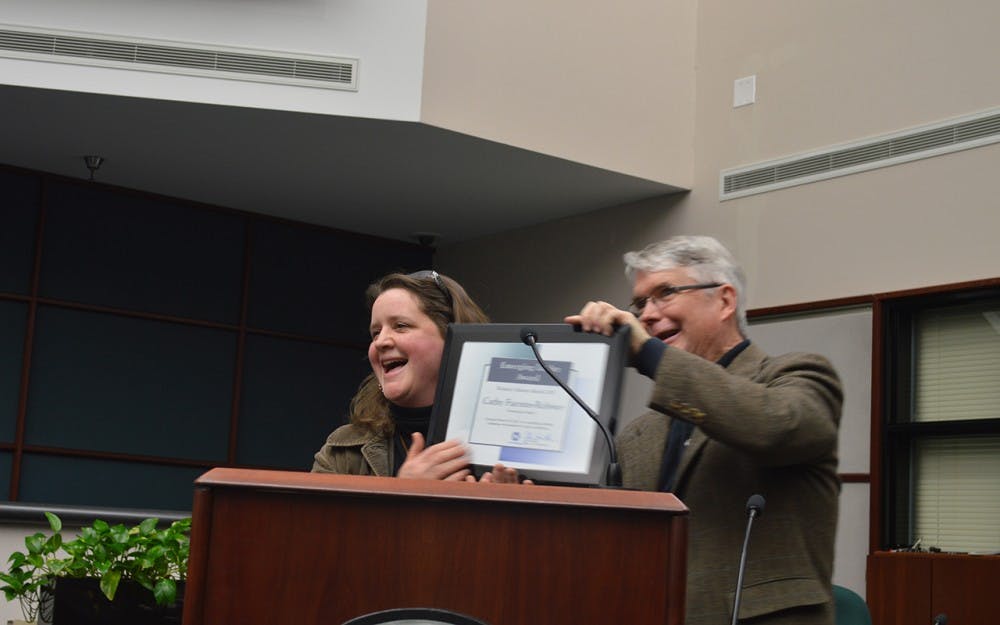An awards ceremony recognized the activism of a local leader in public education Thursday.
The City of Bloomington Commission on the Status of Women’s leadership development event “Linking Arms for Social Justice: If Not You, Then Who?” featured a panel discussion and ceremony for Cathy Fuentes-Rohwer, the winner of the 2017 Emerging Leader Award.
Beth Friedman Kirk, who is a member of the Commission on the Status of Women, said this event was both a networking opportunity and a way for people to learn about social justice issues.
“The purpose of this event is to encourage the women of this community to get involved in social justice,” Friedman said.
The Commission of the Status of Women’s Emerging Leader Award honors women who have risen to positions of leadership in the community.
Fuentes-Rohwer was selected for the award because of her promotion of public education and her advocacy for sufficient funding for schools from the state and keeping public money in public education.
She is the chairperson of the Monroe County branch of the Indiana Coalition for Public Education and a member of the Monroe County Community School Corporation Board. Mayor John Hamilton introduced Fuentes-Rohwer and presented her with the award.
He said it is inspiring to work with Fuentes-Rohwer in her advocacy, including her support of the Monroe County Community School Corporation’s referendum for funding the public school system, which passed in 2016.
In her speech, Fuentes-Rohwer emphasized the importance of funding public education and the need to solve problems of inequality within the school system.
“Public education, like the rest of the history of our country, is rife with inequities that we must address: racism, sexism, xenophobia,” she said. “These are part of the system and its history, but so too is the fight for social justice and racial justice and gender equality.”
Creating these changes is not a simple task, and it requires the support of the community, she said.
“It’s a messy thing, just like democracy, and it requires all of us to roll up our sleeves and get engaged and stay involved,” Fuentes-Rohwer said.
The second part of the program included four panelists.
IU-Purdue University Indianapolis professor of law and policy Sheila Kennedy talked about misogyny, particularly in relation to sexist views against women in the workforce and beliefs about limiting reproductive freedom.
Misogynistic attitudes often are found in people with fundamental views of religion, she said, and they lead to inequality and restriction of reproductive rights.
“All women’s progress is extremely threatening both to religious zealots and insecure men,” Kennedy said.
IU professor emerita in anthropology and Near Eastern languages and cultures Frances Trix discussed refugees, immigration and religion. She described her experience visiting Germany and learning about the country’s attitudes toward refugees.
She said Germany’s mentorship programs and integration of refugees into communities are things the United States could learn from. She also talked about the benefits of sanctuary programs for immigrants.
Immigration attorney Christie Popp discussed the difficulties faced by undocumented immigrants from Mexico and Central America and their reasons for coming to the United States.
She expressed her concerns about the Trump administration’s approach to immigration.
“It’s a big problem, and I think the problem is going to be getting worse for vulnerable populations,” Popp said.
IU gender studies and history professor Amrita Chakrabarti Myers talked about how feminism intersects with other identities, including race and LGBT identities.
She focused on the historical context behind women’s movements, ranging from the suffrage movement of the 1800s to the present time.
She said there is a long history of excluding people of color and LGBT women from feminist movements.
“There is still tension with a lot of different groups of women about trusting each other,” Myers said. “Are we willing to link hands across the divide?”






